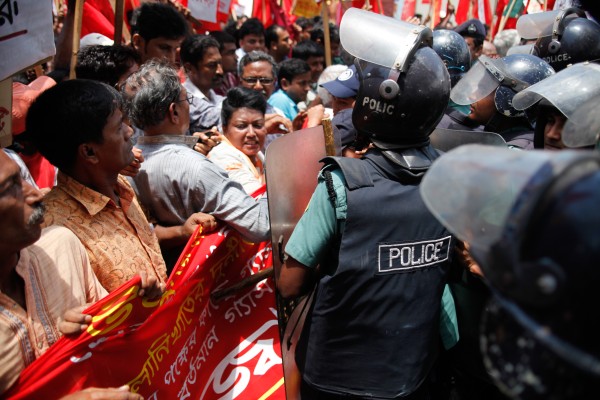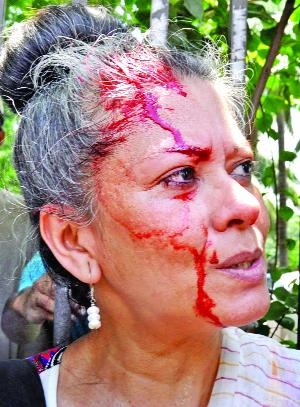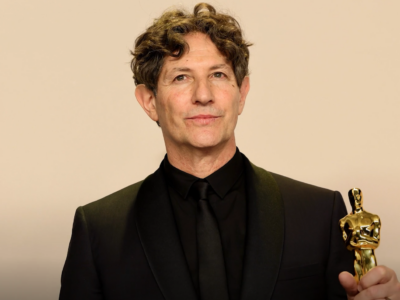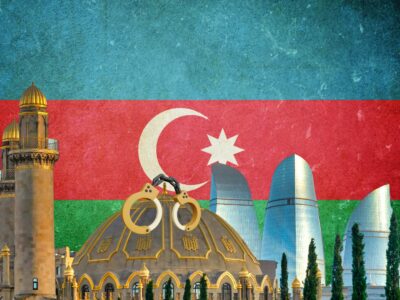Bangladesh has large reserves of natural gas and some petroleum deposits which is the center of attention of many international energy companies. A recent Production Sharing Contract (PSC) between the Bangladesh government and United States (US) energy giant ConocoPhillips for deep sea gas exploration has sparked renewed debate in the country.
Bangladesh, being a populous country with poor infrastructure, itself is an energy starved country and some people are against the export of its natural resources. Activists from the National Committee to Protect Oil, Gas, Mineral Resources, Power and Ports (NCPOGMR) have been campaigning in the country to raise public awareness on this issue.
One of the activists Rahnuma Ahmed writes:
There is a growing national awareness of the issue of ownership of natural resources; of the terms on which production sharing contracts are signed with international oil companies (IOCs); a growing suspicion that exporting extracted gas may not be the best way of solving the nation’s energy shortfall. More precisely, of the hollowness of the government’s reasoning as to why gas blocks need to be, must necessarily be, leased out to multinational companies. More broadly, of whether the nation’s ruling class, regardless of which political party is in power, does act in the interests of the nation, of its people.

A protest arranged by the NCPOGMR against offshore gas deal between Bangladesh Government and US firm ConocoPhillips took place in Dhaka, Bangladesh. Image by Shuvra Kanti Das, copyright Demotix (14/06/11).
On June 16, 2011, ConocoPhillips signed an agreement with Bangladesh government for the oil and gas exploration from two deep-sea blocks in the Bay of Bengal covering an area of 5,158 square kilometres. Two days before the signing (on June 14, 2011) police brutally cracked down on the members of NCPOGMR who were rallying against the deal highlighting corruption and the fact that the share of Bangladesh government of the explorations will be 20% only.
ShahidulNews reports:
The police blockaded the rally near the secretariat, and baton charged the protesters as they approached the barricade. Writer and anthropologist Rahnuma Ahmed was one of several protesters who were injured during the clashes.
Blogger Molla Nasiruddin Hojja writes [bn]:
আমি পত্রিকায় প্রকাশিত রেহনুমা আহমেদের ছবি দেখেছি, যিনি আসলে এক সময় জাহাঙ্গীর নগর বিশ্ববিদ্যালয়ের নৃবিজ্ঞনা বিভাগের শিক্ষিকা ছিলেন। তার মাথা দিয়ে রক্ত পড়ছে এবং মুখ রক্তে ভেসে গিয়েছে। কেন সরকার এমনটা করল। এটা ছিল একটা শান্তিপুর্ণ প্রতিবাদ এবং তারা তো অন্য রাজনৈতিক দলগূলোর মত নয়, বহুজাতিক কোম্পানী এবং সরকার মনে হচ্ছে রক্ত চায়। কিসের জন্য, তেল আর গ্যাসের জন্য, সত্যিকারের রক্তের দাম কয়লা, তেল আর গ্যাসের চেয়ে কম।
Journalist and blogger Arafatul Islam writes in a post titled “Bloodied Rahnuma, Crippled Human Rights” [bn]:
তিনি কোন রাজনীতিবিদ নন৷ একটি স্বাধীন দেশের নাগরিক হিসেবে স্বাধীনভাবে নিজের মতামত প্রকাশের চেষ্টা করেছিলেন মাত্র৷ ইস্যু কনোকো ফিলিপসের সঙ্গে সরকারের বিতর্কিত চুক্তি৷ আপা মনে করেন, দেশের প্রাকৃতিক সম্পদ ভুলভাবে তুলে দেওয়া হচ্ছে বিদেশিদের হাতে৷ এজন্যই প্রতিবাদ৷ এমন প্রতিবাদীর উপর যখন কোন দেশের নিরাপত্তা বাহিনী নির্বিচারে হামলা চালায়, তখন মেনে নিতে হয়, সেই দেশে আসলে ‘গণতন্ত্রের প্রকৃত চর্চা’ নেই৷ সভ্য দেশের কোন গণতান্ত্রিক সরকার এভাবে মানুষের কণ্ঠস্বরকে চেপে ধরতে পারেনা৷
There are also alternative opinions. Sultan Mohammed Zakaria terms these protests as the bankruptcy of the left politics in Bangladesh. The blogger argues:
[..] We understand from the statements from the concerned government ministry and high officials and independent (not Marxist) energy experts that the contract is okay and it satisfies the international standard. However, there is no let up in leftists’ speculations, and sometimes they are deploying many logics which do not exist in the contract.
[..] On the royalty issue which Anu Muhammad and his team argues that Bangladesh will get only 20% which was dismissed by the Energy Secretary who rather told that BD will get 45% share in the cost-recovery phase and the share will naturally increase once cost has been recovered. However, It will get 20% only in the case where Bangladesh will decline to buy the explored gas and Conoco will have to export it for its cost-recovery etc.
Blogger Dinmozur in a previous post highlighted the terms of PSC especially that Bangladesh will have to buy at the market rate and at the terms of the explorer company. As there is no limit of exploration, the gas will be explored at maximum limit and Bangladesh will not be able to buy beyond its need at a given time. So the reserve will be exhausted soon and maximum gas will be exported making Bangladesh's future uncertain.
A commenter at the post of Dinmojur [bn] says:
আমাদের দেশে এত গ্যাস সংকট থাকা সত্ত্বেও ৮০% গ্যাস রপ্তানি রাখার সুযোগ কে তীব্র নিন্দা জানাই।
Rahnuma reveals more conspitracies:
The chorus of voices to be seen and heard now, had been noticeably absent when cables from US embassy Dhaka, WikiLeaked on 24 December night, revealed that US ambassador James Moriarty had met the prime minister’s energy advisor, Tawfiq-e-Elahi Chowdhury, had sought assurances that US-based Conoco Phillips (from among 7 bidders) be awarded two of the uncontested blocks in the Bay of Bengal.
The attacks did not lessen the morals of the activists and fresh rounds of protests have been called.








7 comments